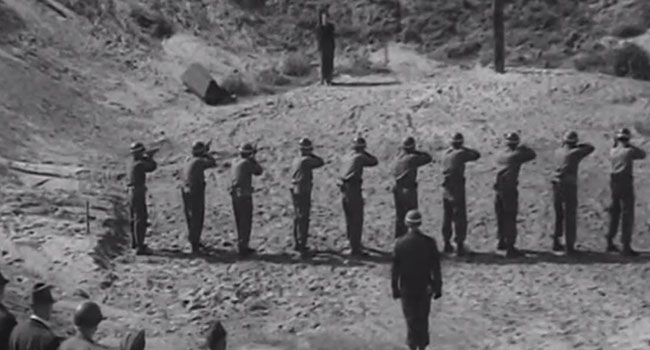 If you’re rewatching Downton Abbey on PBS, you’ll know the plotline about the cook’s nephew who was shot for desertion during the First World War. And such things did occur. For instance, the British and Commonwealth military executed 306 men in those circumstances. They were, as the stark phrase put it, shot at dawn.
If you’re rewatching Downton Abbey on PBS, you’ll know the plotline about the cook’s nephew who was shot for desertion during the First World War. And such things did occur. For instance, the British and Commonwealth military executed 306 men in those circumstances. They were, as the stark phrase put it, shot at dawn.
The Second World War was different. As far as the Western Allies were concerned, there was only one such execution, and it happened 75 years ago. On January 31, 1945, the Americans shot Private Eddie Slovik for desertion.
Originally classified 4-F because of a youthful criminal record, Slovik’s draft status was upgraded when standards were relaxed in order to meet the growing needs for manpower. And in the late summer of 1944, he was assigned to the 28th Infantry in France.
Under fire while en route to the front lines, he and a buddy got separated – perhaps deliberately – from the rest of the group, and turned themselves in the following day to a Canadian military police unit. They were returned to their company six weeks later and no charges were laid.
Slovik, however, made it clear that he didn’t want anything to do with combat, going so far as to ask whether his leaving would be considered desertion. Told that it would be, he left anyway. Then the following morning he returned with a note confessing to desertion and declaring his intention to do it again if he was sent to the front line.
Between that moment and his November 11 court-martial, Slovik was given two opportunities to recant and rejoin his comrades at the front. He refused.
The offer was extended one more time at the court-martial, but again he demurred. So, in a unanimous decision, he was found guilty and sentenced to death. From beginning to end, the hearing took less than two hours.

Private Eddie Slovik
Slovik, it’s been surmised, had a plan. His sentence would be commuted and he’d do some time in military prison, after which he’d be released. In the process, he’d be sure to get back to civilian life in one piece.
And it wasn’t an unreasonable premise. Although the U.S. Army similarly condemned dozens of deserters during the war, you’d have to go all the way back to 1864 to find an example of such a sentence being carried out.
So why was a white guy from Detroit treated differently? And was justice done?
One of the officers who sat on the court-martial panel, Benedict Kimmelman, later concluded that it wasn’t. While Slovik was technically guilty and nobody interfered with the panel’s deliberations, Kimmelman came to the view that they weren’t qualified to pass judgement.
It was his own subsequent experience at the Battle of the Bulge that changed his mind. As a dentist in civilian life, he found that real battle was an eye-opener. In his telling, hundreds of men ran away or prematurely surrendered when faced with desperate circumstances.
Consequently, he maintained, only officers who’d personally experienced combat were truly qualified to act as judges. And the members of Slovik’s court-martial panel hadn’t fitted that bill.
Whether or not one agrees with Kimmelman, there’s no doubt that Slovik was treated differently. To put it bluntly, he was made an example.
Mind you, examples are an essential part of deterrence. If imposed punishments are never inflicted, then they lose all credibility. And maintaining military discipline in wartime is a critical requirement.
Still, one wonders why Slovik drew the short straw.
Prior to his execution, he claimed that it was because of his criminal record. But while this certainly rendered him an unsympathetic figure to those reviewing the post-court-martial appeals, there was more to it.
For one thing, his situation wasn’t that of an exhausted, battle-fatigued soldier temporarily panicking. Rather it was a calculated act of defiance, accompanied by a declared intent to do it again.
And the timing was terrible. On the day that Slovik’s appeal reached the Supreme Allied Commander, Dwight Eisenhower, the Americans were reeling from the initial German thrust at the Battle of the Bulge. Sympathy for an unrepentant war deserter would have been in very short supply.
Bottom line, though, war deserter Eddie Slovik didn’t deserve his fate. He was just an operator whose luck ran out.
Troy Media columnist Pat Murphy casts a history buff’s eye at the goings-on in our world. Never cynical – well perhaps a little bit.
The views, opinions and positions expressed by columnists and contributors are the author’s alone. They do not inherently or expressly reflect the views, opinions and/or positions of our publication.


